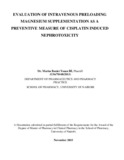| dc.contributor.author | Youan Bi, Marius B | |
| dc.date.accessioned | 2015-12-16T07:39:13Z | |
| dc.date.available | 2015-12-16T07:39:13Z | |
| dc.date.issued | 2015 | |
| dc.identifier.uri | http://hdl.handle.net/11295/93619 | |
| dc.description | Thesis | en_US |
| dc.description.abstract | Nephrotoxicity remains a problem for patients who receive cisplatin based
chemotherapy. Magnesium depletion is known as a complication to chemotherapy with cisplatin
and likely to enhance nephrotoxicity. The National Comprehensive Cancer
Networkrecommended 8mEq intravenous magnesium supplementation as a preventive measure
of cisplatin-induced nephrotoxicity. This intervention is not yet applied in our setting due to lack
of strong evidence.
OBJECTIVE: To evaluate the effect of intravenous magnesium preloading supplementation on
cisplatin-induced nephrotoxicity in cancer patients on cisplatin combination chemotherapy at
Kenyatta National Hospital and Texas Cancer Centre, Kenya.
STUDY METHODOLOGY: 71 patients diagnosed with cancer and who were to receive their
first cycle of cisplatin-based chemotherapy at Kenyatta National Hospital or Texas Cancer Center
at a single dose 60 mg/m2 or above of cisplatin on day 1 were randomly assigned to receive
intravenous magnesium preloading supplementation or not as part of their chemotherapy
regimen. Serum creatinine was measured, and creatinine clearance (CrCl) was estimated by the
Cockcroft–Gault equation. The follow-up period was 17 days. The primary outcome measure was
incidence of acute kidney injury grade 1 or higher as defined by Common Terminology Criteria
for Adverse Event 4.03. Kaplan-Meier survival analysis and Cox regression analysis were also
performed to enable comparison of nephrotoxicity-free survival times and identify predictor
factors for cisplatin-induced nephrotoxicity.
RESULTS: There was a significant decrease in the incidence of CIN in the Magnesium
Preloading Group, compared to the Non-Magnesium Preloading group (12.12 % vs 33.13%,
respectively; P = 0.037). Intravenous Magnesium sulfate supplementation also reduced the
severity of CIN as it significantly reduced the mean maximum change in serum creatinine (0.10
mg/dL (range: -0.090, 1.761) versus 0.19 mg/dL (range: -0.147, 1.86); P = 0.006) and the mean
maximum change in creatinine clearance (-13.2 ml/min (range: -56.3, 17.9) versus -22.05 ml/min
(range: -112.8, 16.5); P= 0.041) in the magnesium supplementation group compared to the nonmagnesium
supplementation group, respectively. Survival analysis showed that magnesium
supplementation also increased the nephrotoxicity-free survival time (P=0.042). Esophageal
cancer and BUN>5 mmol/l were identified as significant predictive factors for cisplatin-induced
nephrotoxicity.
CONCLUSION: The study has provided strong and direct evidence in support of the application
of intravenous preloading magnesium supplementation at the dose of 8 mEq before
administration of cisplatin as a preventive measure of cisplatin-induced nephrotoxicity in cancer
patients treated with cisplatin-based regimen. | en_US |
| dc.language.iso | en | en_US |
| dc.publisher | University of Nairobi | en_US |
| dc.title | Evaluation of intravenous preloading magnesium supplementation as a preventive measure of cisplatin induced nephrotoxicity | en_US |
| dc.type | Thesis | en_US |
| dc.description.department | a
Department of Psychiatry, University of Nairobi, ; bDepartment of Mental Health, School of Medicine,
Moi University, Eldoret, Kenya | |

